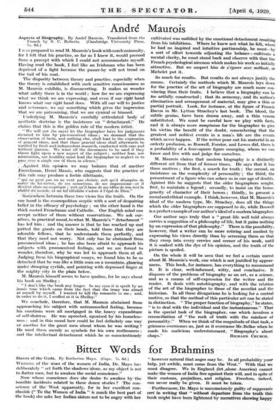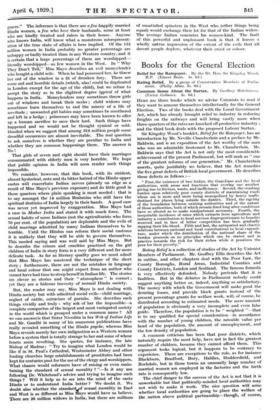Bitter Words for Brahmins
Slaves of the Gods. By Katherine Mayo. (Cape. 7s. 6dt) WRITING of the woes of the women of India, Dr. Mayo has deliberately " set forth the shadows-alone, as my object is not to flatter men, but to awaken the social conscience."
Now whose conscience does she desire to awaken by 'the horrible incidents related 'in these dozen stories ? -The con- science of the- West apparently, for in her excellent con- clusion (" To the Women of India " is much the best part of -the book) she asks her Indian sisters not to be angry with her
" however natural that anger may be. In all probability your help, yet awhile, must come from the West." With that we must disagree. We in England (let alone America) cannot make the women of India free against their will, and in spite of their customs, prejudices, and religion. Freedom, indeed, can never really be given. It must be taken.
• Furthermore, Dr. Mayo is unconsciously guilty of suppressio veri in writing that " without departure from the truth this Wok might h'ave been lightened by narratives showing happy
graces." The inference is that there are a few happily married Hindu women, a few who love their husbands, some at least
who are kindly treated and rulers in their house. Anyone who knows India, will know what a monstrous misrepresent- ation of the true state of affairs is here implied. Of the 155 million women in India probably no greater percentage are
unhappy or badly treated than in any Western country, and it is certain that a large percentage of them are worshipped—
literally worshipped—as few women in the West. In " Why They Don't Tell," Miss Mayo describes an evil moneylender who bought a child wife. When he had possessed her, he threw her out of the window in a fit of drunken fury. There are some sad and horrible details (which, alas! could be duplicated in London except for the age of the child), but we refuse to accept the story as in the slightest degree typical of what happens in India. Moneylenders may sometimes throw girls out of windows and break their necks ; child widows may sometimes burn themselves to end the misery of a life of servitude ; unwanted girl babies may sometimes be smothered and left in a hedge ; princesses may have been known to offer up a human sacrifice to save their lord. Such things have happened and we would not be thought cynical or cold- blooded when we suggest that among 818 million people some dreadful occurences are almost inevitable. The real question to ask ourselves is whether they are peculiar to India and whether they are common happenings there. The answer is No !
That girls of seven and eight should have their marriages consummated with elderly men is very horrible. We hope that public opinion in India will soon render such things impossible.
We consider,' however, that this book, with its strident, almost hysterical, note and its bitter hatred of the Hindu upper castes will exacerbate Indian nerves (already on edge as a
result of Miss Mayo's previous exposure) and do little good in those quarters where plain speaking is most needed : that is
to say amongst the 14 million Brahmins who still have the spiritual destinies of India largely in their hands. A good case was never yet improved by exaggeration. Miss Mayo had a case in Mother India and stated it with much force. The sexual habits of some Indians (not the agriculturists who form 70 per cent. of the population) are deplorable and the evils of child marriage admitted by many Indians themselves to be terrible. Until the Hindus can reform their social customs it is unlikely that they will be able to govern themselves.
This needed saying and was well said by Miss Mayo. But to describe the crimes and cruelties practised on the girl children of India in story form is a very different and far more delicate task. As far as literary quality goes we must admit that Miss Mayo has mastered the technique of the short story ; furthermore, there are not the mistakes in language and local colour that one might expect from an author who 2annot have had time to steep herself in Indian life. The stories are clever as stories and their " atmosphere " is correct : yet they are a hideous travesty of normal Hindu society.
But, the reader may say, Miss Mayo is not dealing with Hindu society but with admitted social evils—child marriage, neglect of cattle, ostracism of pariahs. She describes such things vividly and truly : why ask of her the impossible—a complete conspectus of the largest and most variegated society
in the world which is grouped under a common name ? All we can answer is that Sister Nivedita in her Web of Indian Life and Mr. Gandhi in many of his numerous publications have really revealed something of the Hindu psyche, whereas Miss Mayo reveals merely her own indignation as a Western woman before a system that is totally strange to her and some of whose tenets seem revolting. She quotes, for instance, the late Bishop of Madras : " Try to imagine what London would be like if in St. Paul's Cathedral, Westminster Abbey and other leading churches large establishments of prostitutes had been kept for centuries past for the use of the clergy and worshippers. What chance would reformers have of raising or even main-
taining the standard of sexual morality ? "—Is it any use following Dr. Whitehead's advice and trying to imagine such things ? Will it help us to see into the mind of the caste
Hindu or to understand India better ? We doubt it. We doubt also whether the standard.of sexual morality in East and West is as different as Miss Mayo would have us believe. There are 26 million widows in India, but there are millions
of unsatisfied spinsters in the West who (other things being equal) would exchange their lot for that of the Indian widow. The average Indian venerates his women-kind. The fault of this powerful and unpleasant book is that it leaves a wholly untrue impression of the extent of the evils that all decent people deplore, whatever their creed or colour.







































 Previous page
Previous page